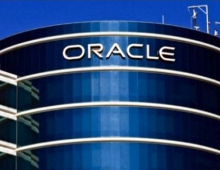
Oracle Accelerates Its Databases
Oracle Chief Executive Larry Ellison on Tuesday launched "in-memory" technology for speeding up data analysis.
In-memory computing pushes information into RAM instead of reading it off of disk, providing significant performance boosts.
The features allow for faster database queries and transactions as companies collect, store and analyze growing amounts of information across the Internet.
According to Oracle, its in-memory option can take advantage of the company's well-established capabilities for database scalability, high-availability and security.
The technology will go on sale in July as an add-on to Oracle's existing databases.
Oracle's add-on creates an in-memory column store, which speeds up analytic queries, while preserving the database's existing relational row store for OLTP (online transaction processing) workloads. The column store does away with the overhead required to maintain row-based analytic indexes, improving OLTP performance.
"It's the ability to run most of your data, all the data you frequently access, in memory and access that data basically instantaneously," Ellison said.
Oracle is taking the fight to IBM, Microsoft, and SAP in the burgeoning in-memory database market.
The features allow for faster database queries and transactions as companies collect, store and analyze growing amounts of information across the Internet.
According to Oracle, its in-memory option can take advantage of the company's well-established capabilities for database scalability, high-availability and security.
The technology will go on sale in July as an add-on to Oracle's existing databases.
Oracle's add-on creates an in-memory column store, which speeds up analytic queries, while preserving the database's existing relational row store for OLTP (online transaction processing) workloads. The column store does away with the overhead required to maintain row-based analytic indexes, improving OLTP performance.
"It's the ability to run most of your data, all the data you frequently access, in memory and access that data basically instantaneously," Ellison said.
Oracle is taking the fight to IBM, Microsoft, and SAP in the burgeoning in-memory database market.





















